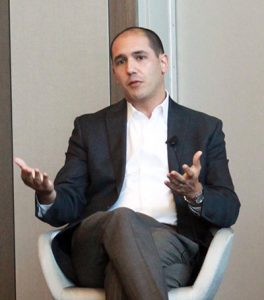The California Chamber of Commerce joined the California League of Food Producers in presenting a Proposition 65 workshop for members yesterday. CalChamber Policy Advocate Adam Regele and Anthony Samson, senior attorney/policy advocate with Arnold & Porter were among the workshop speakers.
Prop. 65 Background
Proposition 65, the Safe Drinking Water and Toxic Enforcement Act of 1986, is the most far-reaching consumer “right to know” law in the nation. Although Proposition 65 prohibits listed chemicals from being discharged into sources of drinking water, the law is best known for its broadly crafted warning requirement.
Specifically, Proposition 65 requires businesses with 10 or more employees to provide a clear and reasonable warning before knowingly and intentionally exposing individuals to chemicals that the State of California, through the Office of Environmental Health Hazard Assessment (OEHHA), has determined cause cancer and/or reproductive toxicity.
The warning requirement applies to all products sold in California, even if they are manufactured in a different state or country. Since Proposition 65 was enacted, the list of chemicals has grown exponentially to approximately 950 chemicals, making Proposition 65 a consideration—and in many ways a significant burden—for companies in virtually every industry sector.
Prop. 65: The Basics

Anthony Samson started the conference with an introduction to the legal requirements and regulations of Proposition 65 and the potential litigation exposure for companies selling products into California.
Samson discussed how Proposition 65 is enforced and how the law is applied to and affects the food and retail industries.
Compliance Strategies in the Ever-Changing World of Prop. 65
The second panel of the morning was moderated by Mona Shulman, Pacific Coast Producers, and included panelists: Robert Falk, Morrison Foerster; Lee Smith, Coleman & Horowitt; Trent Norris, Arnold & Porter; and Aaron Moreno, California Grocers Association.
The panel addressed specific strategies for Proposition 65 compliance and reducing liability for food producers and retailers.
Hot Prop. 65 Issues Relating to Food

After lunch, panelists focused on the most significant Proposition 65 issues affecting the food industry, including regulatory actions on naturally occurring levels of lead, the listing of processed meats, BPA signage, as well as recent enforcement actions and litigation relating to arsenic in rice, acrylamide, furfuryl alcohol, and glyphosate.
CalChamber Policy Advocate Adam Regele moderated the panel, which included participants: Trent Norris, Arnold & Porter; Gary Roberts, Dentons; and Robert Falk, Morrison Foerster.
Prospects for Reform
The final panel of the day was moderated by Trudi Hughes, California League of Food Producers, and included panelists: Lindsay Stovall, American Chemistry Council; Anthony Samson, Arnold & Porter; and John Hewitt, Grocery Manufacturers Association.
The group discussed potential reforms to Proposition 65, including in-store signage, digital warnings, enhanced scientific requirements in the listing process, litigation reform, federal preemption, regulatory reform for naturally occurring listed chemicals, and a potential ballot measure to address food issues.
Staff Contact: Adam Regele


